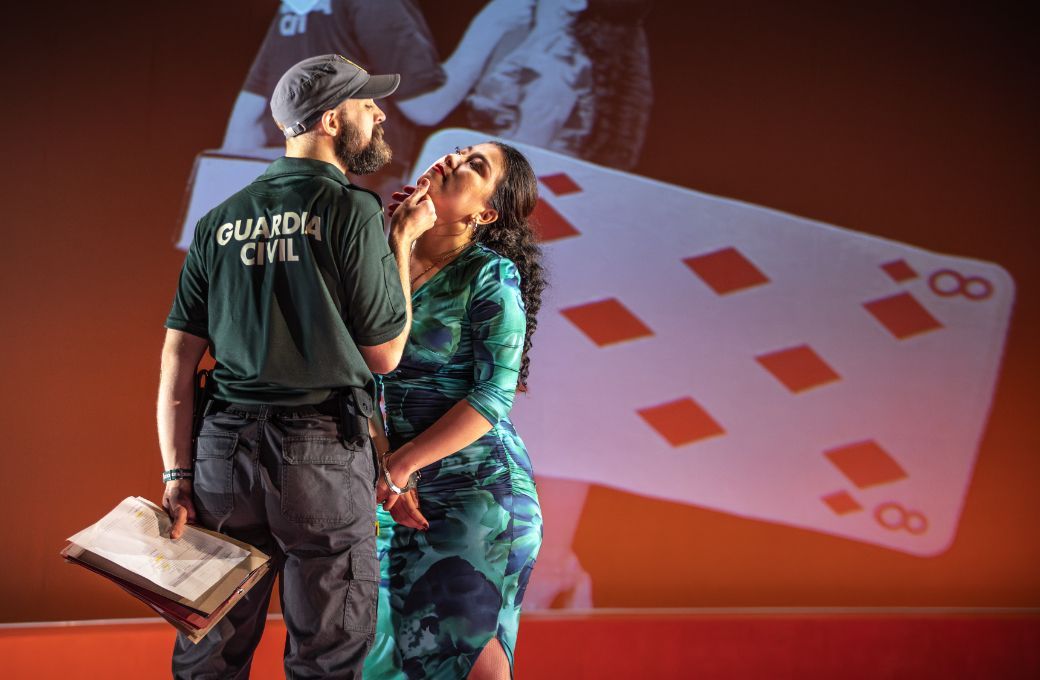While one of London’s conservatoires had its students exploring some lesser known operas, Royal Academy Opera has put its young singers to the test in one of the most famous pieces in the repertoire: Bizet’s Carmen. It’s a work that we’re used to seeing performed by the leading singers of our day in some of the biggest houses, and the prospect of a performance in the more intimate surroundings of the Susie Sainsbury Theatre was an intriguing one.

Director Harry Fehr gives the work a contemporary updating. The dragoons become Sevillian police while Micaëla brandishes a tote bag exhorting the banning of bullfights – a smart reflection of an innately gentle and moral character. Yannis Thavoris’ set is barren, reflecting the practical challenges of the multiple scene changes that Carmen demands. The production’s big conceit is video projection offering multiple sliding doors moments: if Don José hadn’t let Carmen go; if Carmen had grabbed the knife and stabbed Don José instead et cetera. In theory, it isn’t a bad concept, but in practice it adds little and actively detracts attention from the principals during crucial scenes. These performers deserve our full attention.
It is unusual to write of a performance of Carmen that Micaëla stole the show. So often she is little more than a drip, at best a conventional foil to the unconventional Carmen. José is drawn to girls who drink, smoke, dance on tables and inexorably lacerate the heart, so it is entirely to soprano Grace Hope-Gill’s credit that she imbued Micaëla with an energy and spirit that defied conventional performance trends. Hope-Gill’s Micaëla does not sashay around in mini-skirts, but neither is she a whimpering wreck. She has desire, agency and fortitude, and crucially she isn’t sanctimonious. Hope-Gill’s soprano is soft, but powerful, with plenty of lift at the top of the voice and support at the bottom – a singer to watch.
Zixin Tang’s Camren was a slightly enigmatic Carmen; punchy in the higher register in big moments, but under-projected elsewhere. It isn’t immediately clear that the role is a natural fit, but she showed plenty of stage presence and a fine sense of the text. Konstantinos Akritides was a suitably awkward José, making a reasonable stab at portraying the character’s professional and emotional collapse. His is a somewhat nasal tenor and tone was occasionally sacrificed in the more demanding passages. Tom Butler’s smooth baritone was energetically deployed for a virile, yet classy Escamillo, while Fionn Ó hAlmhain sang Zuniga with a robust bass. Fine performances from Caroline Blair and Alexandria Moon, as Fraquita and Mercédès respectively, left one wishing to hear more; particular credit to Moon who had stepped in at the eleventh hour to sing the role from the side to replace an indisposed Amy Porter. The principals were bolstered by the enthusiastic contributions of the Royal Academy Opera Chorus.
In the pit, Christopher White led the Royal Academy Sinfonia in a punchy reading of the score which suffered slightly from the odd brass fluff and the occasional patchy moment in the violins. As always, though, a pleasure to see the young singers of the future tackling difficult music with gusto.


